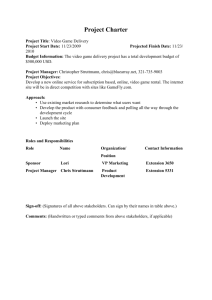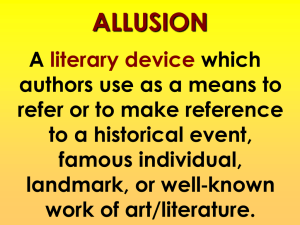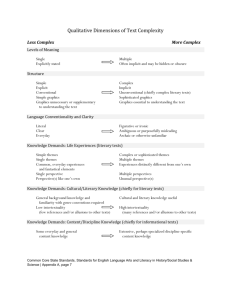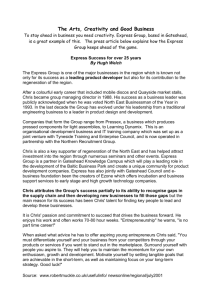Allusions of Television - The Homepage of Dr. David Lavery
advertisement
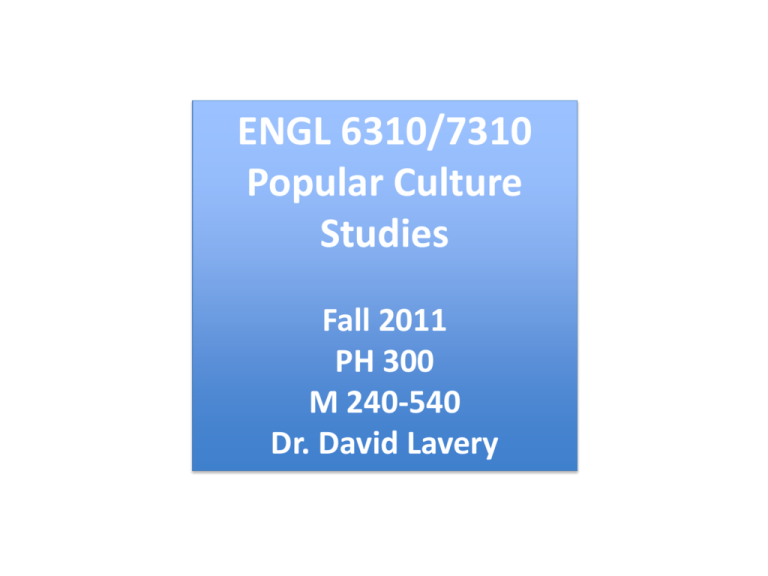
ENGL 6310/7310 Popular Culture Studies Fall 2011 PH 300 M 240-540 Dr. David Lavery My colleagues (I teach in an English Department), convinced television is a sinister force destined to destroy literacy and dumb down culture and appalled at my traitorous introduction of its study into hallowed halls that once echoed with the language of Chaucer, Shakespeare, Keats, Conrad, and Faulkner, were not amused when I suggested we tout our rich-in-popular culture course offerings in new promos, updating the old curricular formula, inviting study of “Beowulf to Buffy (and Virginia Woolf, Too).” Not convinced by recent arguments to the contrary like Steven Johnson’s Everything Bad is Good for You: How Today’s Popular Culture is Actually Making Us Smarter, television’s antagonists, in their ignorance, would have us believe the “vast wasteland” offers nothing (with the exception of an occasional Masterpiece Theatre) to the literary minded. Though I am under no illusion they will listen, allow me to survey contemporary television in search of but one manifestation of the literariness the rabid book-loving-TV-haters imagine absent from the medium: the allusion. Allusions, of course, are direct or indirect references in a work of art, usually “without explicit identification, to a person, place or event” or to another work (Abrams 8). Wherever they appear, allusions are, of course, part of that vast and intricate system of intertextuality carefully examined in Jonathan Gray’s recent book. Allusions are not, of course, limited to the literary, even though they carry with them, because of their bookish past, a kind of literary cache. It would, of course, be easy to find in the wasteland allusions to other inhabitants of the wasteland. When Ed Hurley and Agent Cooper visit OneEyed Jacks in Twin Peaks using the aliases of Barney and Fred, the teleliterate (Bianculli) picking up on a reference to The Flinstones is much easier than understanding the series’ vatic mysteries. When, on Lost, a British businessman buys the Slough branch of the Wernham Hogg paper company, we may not immediately recognize the momentary diegetic intersection with the BBC’s Office, but the allusionary crossing is there to follow nonetheless. I want to examine here not television’s incestuous televisual allusions but its literary ones. For with surprising regularity, the wasteland invokes not just Eliot’s “Wasteland” (Wilcox) but the whole world of literature to which it remains a seldom respected heir. First, consider series like Seinfeld (NBC, 1989-1998), Twin Peaks (ABC, 19901992), and Buffy the Vampire Slayer (WB, 1997-2001; UPN, 2001-2003)—all series famous for being rife with popular culture references. “It’s so sad. All of your knowledge of high culture comes from Bugs Bunny Cartoons,” Elaine laments to Jerry in the Season Four Seinfeld episode “The Opera,” but the series itself exhibits more than a cartoony awareness of the literary, giving us references to Death of a Salesman (Jerry repeatedly refers to George as “Biff”), The Great Gatsby, Moby-Dick, Salman Rushdie, Tropic of Cancer and Tropic of Capricorn, and Tolstoy and War and Peace. Twin Peaks hardly limited itself to movie, television, and music references, though full of them. Remember that discussion of the Heisenberg indeterminancy principle at the Double R Diner? By the series’ premature end, the attentive Peaker had no doubt noticed that Edmond Spenser’s Fairie Queene (Windom Earle and Leo Johnson’s “verdant bower”), the Arthurian legends (Glastonbury Grove, King Arthur’s burial site, is home to the Black Lodge as well), and Knut Hamsun (the Nobel-Prize winning Norwegian novelist and fascist, much admired by Ben Horne), have all set up housekeeping in Twin Peaks. In seven seasons under the creative control of fanboy/comic book geek/pop culture genius Joss Whedon, Buffy the Vampire Slayer was crammed with references to television, comics, film, music, and literature. The poetry of Robert Frost, Elizabeth Barrett Browning, and Emily Dickinson; a plethora of books and writers—Alice in Wonderland, The Call of the Wild, Brave New World, Doctor Jekyll and Mr. Hyde, William Burroughs, The Lion, the Witch, and the Wardrobe, Of Human Bondage, Heart of Darkness, C. S. Forester, Uncle Tom’s Cabin, Vanity Fair, The Open Road, Where the Wild Things Are, Uncle Tom’s Cabin, Ann Rice; and a variety of plays—Oedipus Rex (hilariously performed in a talent show in Season One), The Merchant of Venice, Othello, Waiting for Godot, Death of a Salesman (a dream version with a cowboy and a vampire), all these and more put in cameo appearances in Sunnydale. In Buffy’s most extraordinary allusional moment, in the astonishing “Restless,” an episode made of four dream sequences, Willow inscribes Sappho’s lesbian poem “Mighty Aphrodite” on her lover Tara’s naked back. Not surprisingly, the Buffy spinoff Angel makes abundant use of literary allusions as well. I will limit myself here to only one. In a Season One episode the series’ titular hero, an over-two-centuries-old vampire, is forced to briefly masquerade as a docent in an art museum. Luckily he has personal knowledge of the painting before which he stands: And this brings us to Manet's incomparable La Musique Aux Tuileries, first exhibited in 1863. On the left one spies the painter himself. In the middle distance is the French poet and critic Baudelaire, a friend of the artist. Now, Baudelaire . . . interesting fellow. In his poem “Le Vampyre” he wrote: “Thou who abruptly as a knife didst come into my heart.” He, ah, strongly believed that evil forces surrounded mankind. And some even speculated that the poem was about a real vampire. (He laughs) Oh and, ah, Baudelaire's actually a little taller and a lot drunker than he's depicted here. Perhaps the first mention on television of the French symbolist poet and drug enthusiast, but then again Angel may well have been the first television character who knew Baudelaire personally. Literary allusions crashed on mystery island along with the survivors of Oceanic 815 in ABC’s huge international hit Lost. Not only are well known philosophers—England’s John Locke and France’s Jean-Jacques Rousseau— evoked by character names, several books become images in the frame, including Henry James’ The Turn of the Screw, Flann O’Brien’s The Third Policeman, Madeline L’Engle’s A Wrinkle in Time, and Richard Adams’ Watership Down, and still others—Lewis Carroll’s Alice in Wonderland, James Hilton’s Lost Horizon, and Daniel Defoe’s Robinson Crusoe—are clearly brought to mind. Seen in “Not in Portland” Books on The Island/In the Diegesis Seen in “Maternity Leave” Books on The Island/In the Diegesis Seen in “A Tale of Two Cities” Books on The Island/In the Diegesis Seen in “Catch-22” Books on The Island/In the Diegesis Seen in “Par Avion” Books on The Island/In the Diegesis Seen in “The Man from Tallahassee” Books on The Island/In the Diegesis Seen in “Eggtown” Books on The Island/In the Diegesis Seen in “Maternity Leave” Books on The Island/In the Diegesis Seen in “Flashes Before Your Eyes” Books on The Island/In the Diegesis Seen in “The Long Con” “An Occurrence at Owl Creek Bridge” “The Damn Thing” “A Psychological Shipwreck” Books on The Island/In the Diegesis Seen in “Every Man for Himself” Books on The Island/In the Diegesis Seen in “He’s Our You” Books on The Island/In the Diegesis Seen in “Orientation” Books on The Island/In the Diegesis Seen in “Orientation” Books on The Island/In the Diegesis Seen in “316” Books on The Island/In the Diegesis Seen in “Confidence Man” Books on The Island/In the Diegesis Seen in “Numbers” Books on The Island/In the Diegesis Seen in “Eggtown” Books on The Island/In the Diegesis Ancestor Texts Ancestor Texts Ancestor Texts 1. Harry Potter and the Sorcerer’s Stone 2. Harry Potter and the Chamber of Secrets 3. Harry Potter and the Prisoner of Azkaban 4. Harry Potter and the Goblet of Fire 5. Harry Potter and the Order of the Phoenix 6. Harry Potter and the HalfBlood Prince 7. Harry Potter and the Deathly Hallows Ancestor Texts Ancestor Texts Ancestor Texts Ancestor Texts Ancestor Texts Ancestor Texts Ancestor Texts Ancestor Texts Ancestor Texts Lost Philosophers: John Locke Lost Philosophers: David Hume Lost Philosophers: JeanJacques Rousseau Lost Philosophers: Jeremy Bentham Since, until recently, television routinely kept its episode titles to itself, it has been easy to miss the many literary references to be found there, then and now. Consider, for example, the final episode of the short-lived but watershed ABC series My So Called Life (1994) entitled “In Dreams Begin Responsibilities”—a somewhat obscure allusion to a book of the same name by the American poet and writer Delmore Schwartz; or the Steinbeck-evoking pun in the title of an upcoming Veronica Mars episode “The Rapes of Graff” (compare to The Simpsons’ “The Crepes of Wrath”); or The Gilmore Girls’ “Say Goodbye to Daisy Miller,” with its reference to the Henry James novella (one of a score of literary show titles in the series); or “The Betrayal,” Seinfeld’s famous “backward” episode, which takes its title from Nobel Laureate Harold Pinter’s similarlythemed (though opposite in tone) play of the same name. Taking great pride, and capitalizing on a great branding opportunity, in being “not TV,” HBO programs are just as rich in literary allusions as in nudity and vulgarity. Not surprisingly, Deadwood, created by former Yale University English professor David Milch and written in a language indebted to both Shakespeare and the Victorian novel, offers many a literary reference (did Alma Garrett just compare Miss Isringhausen to Cotton Mather?). But it is on HBO’s flagship series The Sopranos, where the literary allusions by far outnumber the whacks, the wiretaps, and the lapdances, that the not-TV allusions find their true home. (The following catalog is limited to Seasons Four and Five only.) Mr. Wexler explains to Carmela that A. J. has turned in a “surprisingly cogent” draft on George Orwell’s fable Animal Farm. With Rosie Aprile’s depression in mind, Janice laments “Ah, Bartleby. Ah, humanity,” quoting the final lines of Melville’s novella. Another Melville novella puts in an appearance when A. J. has to write a paper on “Billy Budd,” an assignment which leads to a later discussion (evoking the iconoclastic critic Leslie Fiedler) about its possible gay subtext. (His next reading assignment is Thomas Mann’s Death in Venice.) Meadow tells her mother she read “half the canon” while lying by the pool. Tony B. confesses to Christopher that “some very sorry people” once called him Ichabod Crane (the main character in Washington Irving’s “The Legend of Sleepy Hollow”). New York underboss Johnny Sack cites Shakespeare’s Macbeth—“creeps in this petty pace”—in complaining about his long wait for the overboss to die. In after-extra-marital sex pillow talk, Mr. Wexler tells Carmela Soprano about Heloise and Abelard, after she finds their letters as reading material in the English teacher’s bathroom. One of Tony’s captains speaks enviously of the earning potential of the Harry Potter books. Ready to embark on a trip to Europe, Meadow recommends her parents read Henry James in order to learn more about “the restorative nature of travel.” A. J. buys a paper on Lord of the Flies on the Internet. Carmela reads Flaubert’s Madame Bovary. Melfi quotes Yeats’ poem “The Second Coming” to an uncomprehending Tony. A fifth season episode takes its title from Flaubert’s A Sentimental Education. Machiavelli. Nicolo (1469–1527) Italian writer, statesman, and political theorist, author of The Prince. Tony recalls (after reading Sun Tzu) his encounter (via Carmela's Cliff Notes version) with "Prince Matchabelli" (3.6). Quasimodo Bobby Bacala insists that he predicted 9/11 (4.1). The hunchback bell ringer in Victor Hugo's The Hunchback of Notre Dame (1831) Nostradamus See Quasimodo (4.1). “Nostradamus (1503–1566), born Michel de Nostredame, is one of the world's most famous authors of prophecies. He is most famous for his book Les Propheties, which consists of rhymed quatrains . . . grouped into sets of 1., called Centuries” (from Wikipedia.com). Northern Exposure (1900-1995) was always a supremely literary television series. In the Season Three episode "Cicely" (3: 23), for example, we learn that Franz Kafka once visited the small Alaskan town, where he was first inspired to write "Metamorphosis." In Season Five’s “Una Volta in L'Inverno" (5: 17), septuagenarian store owner Ruth Anne Miller sets out to learn Italian so she can read Dante’s Divine Comedy in the original. Season Six’s "Up River" (6: 8) evokes Conrad’s Heart of Darkness (not to mention its cinematic reimagining in Apocalypse Now), with Ed Chigliak playing Harry Marlow/Benjamin Willard and Joel Fleischman as Kurtz. And from first episode to last, morning DJ Chris Stevens’ radio monologues are full of references to great writers and thinkers. “Deconstruction at Bat: Baseball vs. Critical Theory in Northern Exposure’s ’The Graduate.’” Critical Studies in Television 1.2 (Autumn 2006): 33-38. Republished in Baseball/Literature/Culture: Essays. Ed. Ronald E. Kates and Warren Tormey. Jefferson, NC: McFarland, 2008: 98-104. As Robert J. Thompson has observed, Sometimes Northern Exposure wasn't just like reading a good book, it actually presented people reading good books. Throughout one entire episode [Season Two’s "War and Peace"], for example . . . Chris Stevens . . . reads passages from War and Peace. In the meantime, according to the producers' plot synopsis, the residents of Cicely "experience Tolstoyesque nightmares and Dostoyevskian passions." Chris, an intellectual dilettante who seemed to be taking all of his on air rambling patter from a college syllabus, went a long way in giving the show its cerebral if somewhat selfimportant veneer. At one time or another during the course of the series, Chris made references to works by Hegel, Kierkegaard, Kant, Nietzsche, de Tocqueville, Jefferson, Whitman, Baudelaire, Melville, Shakespeare, Jung, Jack London, Edna St. Vincent Millay, and many other authors. No nerd, Chris was just as fluent with Raymond Chandler or Def Leppard, but it was his perpetual name-dropping and passage citing from the Great Books that seemed to announce, as [John] Falsey and [Joshua] Brand [the series’ creators] had often boasted, that Northern Exposure wasn't written for the "mass audience." No single installment of Northern Exposure seemed less directed to a mass audience than "The Graduate," written by Sam Egan and directed by James Hayman, an episode, very near the end of the series’ run, concerned with Chris’ defense of his thesis, in partial fulfilment of an M.A. in a University of Alaska extension program. Indeed, the intended audience for "The Graduate" would seem to be not someone with a Nielsen box but the faculty of an English department. Chris has, it seems, penned a deconstructionist/postcolonial reading of the Ernest Lawrence Thayer classic "Casey at the Bat" and finds himself forced to navigate the Scylla and Charybdis of his openly adversarial committee members. Professor Dick Schuster, a traditional literary scholar who (in his own words) wants to treat "a poem as a poem and not just a code," dislikes reading presentist political implications into a poem from 1888, and refuses to grant a "diploma for glibness, nor even erudition." Prof. Aaron Martin, on the other hand, an advocate for "interpretive freedom" and "hermeneutic license," is a young Turk, impressed by the candidate’s outlaw status (a high school drop-out, Chris had once done hard time back in West Virginia) and predisposed to the thesis’ understanding of the big guy at the plate as a combination Nietzschean übbermensch and emblem of American manifest destiny. As Chris’ orals begin, we get a taste of the opposing forces. At the outset, Professor Schuster reminds Chris that "brevity is the soul of wit," and Martin counters his senior colleague’s quotation of Alexander Pope by evoking Dorothy Parker’s "Brevity is the soul of lingerie." In response to Schuster’s question, Chris successfully defines "objective correlative," identifies T. S. Eliot as the source of the term, and recites William Carlos Williams’ “Red Wheelbarrow” as an example. Then Martin asks a question that would seem like a parody if it weren’t frighteningly representative: "In what way does the relativism embodied in Melville"s duality of evil presage the moral ambiguities of twentieth century colonialism?" "Heaven help us," Schuster groans, but Chris answers in the spirit of the question, proclaiming radical notions about the "whole paradox of colonialism, the benevolent imperialist, the hubris of the first world, the marine corporal with a Zippo in Nam who had to burn down the village in order to save it." Though I cannot be absolutely certain, I would venture to say that this may have been the first, and perhaps the only, time "objective correlative" was ever discussed in prime-time. It may also have been the network television debut of the word "presage." At this point, however, tensions are only simmering. No one is taking Chris to task for his mangled metaphors—how precisely does one bring a "great white whale to its knees"?—or his ideas. Prof. Martin is pleased, deeming Chris rant "right on," and Professor Schuster bites his tongue, not yet ready to go to war. After Martin and Schuster hit up Maurice for endowing a chair (clearly an ongoing discussion), talk turns to Derrida and Barthes, and the death of the author (a moment in literary history praised by Martin as a releaser of all the hidden meanings buried in a text), and Chris expresses for the first time misgivings about his poststructuralist way of approaching literature, wondering what happens to "beauty is truth, truth beauty" (Keats—from "Ode on a Grecian Urn") under such an episteme. Banter between Martin and Schuster becomes increasingly confrontational, and this time it’s personal. To the former’s accusation that his senior colleague clings to old ideas in order to remain department chair, Schuster responds with sarcastic glee “You better get used to those faculty apartments.” When Schuster scolds Martin that “You and your carjacking protégé . . .have put 2000 years of accumulated knowledge into a rhetorical Osterizer and grinded it all into oblivion.” he characterizes Schuster’s old- fashioned mindset as “bigotry with panache.” As Chris looks on in wonder, they go for each other’s throats but are separated by the powerful Minnifield, who angrily (and hilariously) reminds them "Gentleman, it’s only literature.” Earlier Chris had offered a toast to academia: "in a world of ever more compromise and pettiness, the last refuge for ideas and idealism for their own sake." At Maurice’s Chris begins to realize his naiveté and sees for the first time that the hostility critical theory has spawned may be a sublimation of such non-intellectual petty matters as who holds the department chair, or secures the office with a window, or gets the best housing. As the cliché we all know has it, the competition is so fierce because the rewards are so small. Television doesn’t get any better, or any more literary, than this. Shakespeare, of course, gets all the best lines—his "They got Eddie!" lament upon the death of Poe, his anachronistically fatal quotation of Dickens’ A Tale of Two Cities. But it is Chris who comes away terrified but enlightened by his dream-shattering ouroboric recognition that the canon-terminating sniper—and take note how well the metaphor works—is really himself. The next day, "Chris in the Morning" is all about his doubts. As Ray Charles wails the appropriately titled "Tell me What I Say" in the background, Chris acquaints all of Cicely (and the television audience as well) with his growing methodological concerns. "You analyse something too much you just grind it into dust," he has come to think, wondering if his whole pursuit of a degree may have been a misguided venture: "I should never have opened that matchbook. We are looking for people who like to think.’’ But such musings are, in fact, rhetorical, for Chris has concocted a new plan for his thesis defense. Anyone who has been around universities for a time has probably heard Academic Legends about theses and dissertation defences—the one making the rounds when I was working on my M.A., for example, about the doctoral candidate at the University of Minnesota who lost his lunch all over the conference table. Thesis and dissertations have even found their way into films. In Irvin Kershner’s The Eyes of Laura Mars (1978), for example, released the year I finished my own dissertation, a serial killer is revealed to be a detective (played by Tommy Lee Jones) driven to psychopathy by his inability to even finish his treatise. Earlier in the decade, in Richard Rush’s forgotten semiclassic Getting Straight (1970), Elliott Gould plays a deeply confused graduate student named Harry Bailey who inadvertently brings to his thesis defense at Berkeley a hollowed-out book filled with pot and then, as riots erupt outside and his committee becomes embroiled in a debate over Leslie Fiedler-esque ideas about the homoerotic subtext of The Great Gatsby, goes nuts. After insisting that the major verse form in English is, in fact, the limerick (and reciting a particularly profane one), Bailey jumps up on the conference table and brings the defense to an end by planting a sloppy kiss on the lips of his committee chair. "What’s the meaning of this?" Schuster asks, appropriately enough, as they arrive at Minnifield Field, and Chris, punning, replies that he wants to “take another swing” at Thayer’s meaning. To Martin’s surprised rejoinder, "I thought you were beyond authorial reference," Chris asks him to take a bat and go to the plate. As Chris recites the poem from memory, Martin goes down on strikes three snow-covered pitches later, the last two whiffs, just like the Mighty Casey. Striding toward his vanquished examiner, Chris intones Thayer’s final lines: Oh, somewhere in this favored land the sun is shining bright, The band is playing somewhere, and somewhere hearts are light; And somewhere men are laughing, and somewhere children shout, But there is no joy in Mudville—mighty Casey has struck out. Pointing to Martin’s stomach, he explains "That’s what Casey at the bat is about—that feeling in your gut." "I thought you were beyond authorial reference." It’s one of those meta-media moments that make a proselytiser for television, especially what I have been calling of late "television creativity," squirm with joy on my couch potato couch. Mirroring in its development its antecedent media literature and the movies, both slow to discover the author/auteur and then surprisingly anxious to finish him off, television, you see, is supposed to be made in anonymity. Only now, as we speak, are TV auteurs emerging. Only now are we beginning to recognize the creative human beings who make television, a medium, nearly everyone agrees, supremely friendly to the writers who produce such brilliant fare as “The Graduate” while toiling largely in obscurity. I know next-to-nothing about Sam Egan, its author, which doesn’t seem quite fair, since he seems know a lot about me—about us. But I do know this: like me he believes that deconstruction has had its turn at bat, its innings even, and has now struck out. Allusions, the great literary scholar M. H. Abrams, observes, “imply a fund of knowledge that is shared by an author and an audience. Most literary allusions are intended to be recognized by the generally educated readers of the author’s time,” though some have always been “aimed at a special coterie” and, in modernist literature, may be so specialized that only scholarly annotators will be able to decipher them (8-9). TV’s allusions likewise imply a mutual “fund of knowledge.” When they are merely to the rest of the vast cosmos of television, as they often are, they presume nothing more than the commonality of many hours before the small screen. But television’s proliferating literary references stand as a testimony to the medium’s increasing sophistication as its begins to partake in “the conversation of mankind” (Rorty), to the wider, deeper repertoire of its writers, and to new, much more flattering, assumptions about the intellectual qualities of the Quality TV audience. If some of the allusion of television are now so arcane only English professors can elucidate them, well do we not need new challenges, new work to do?




